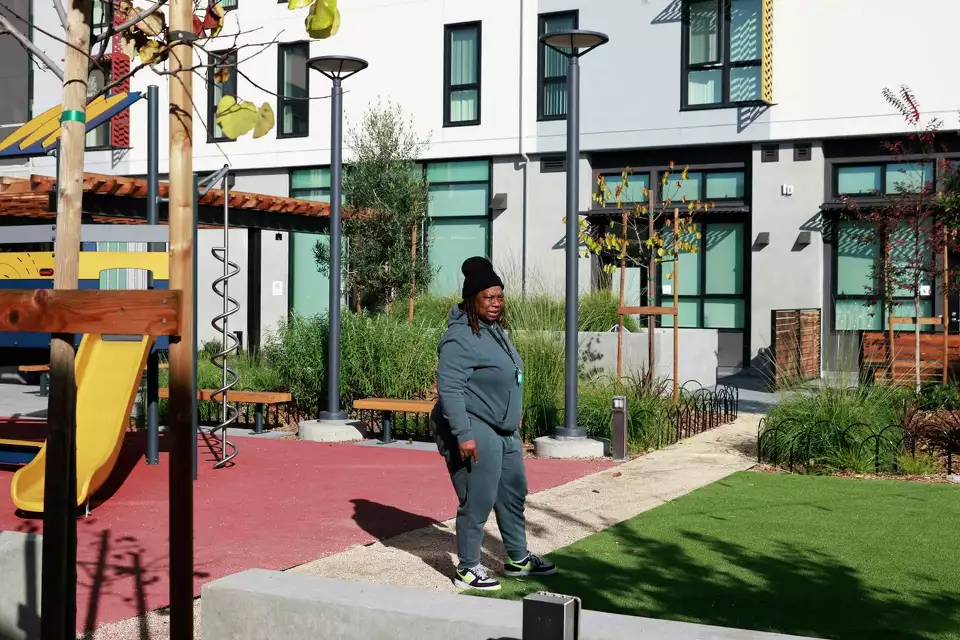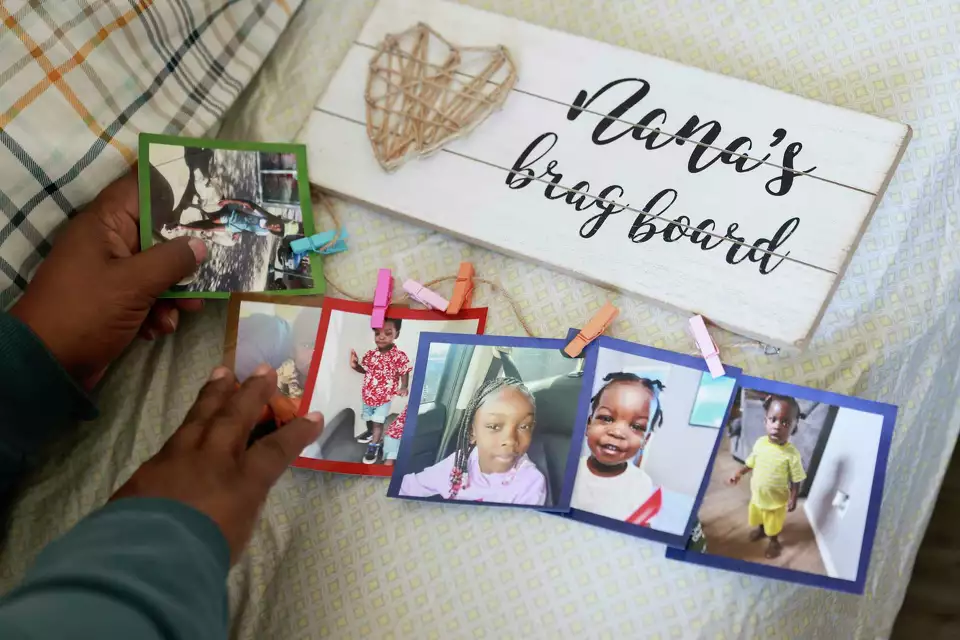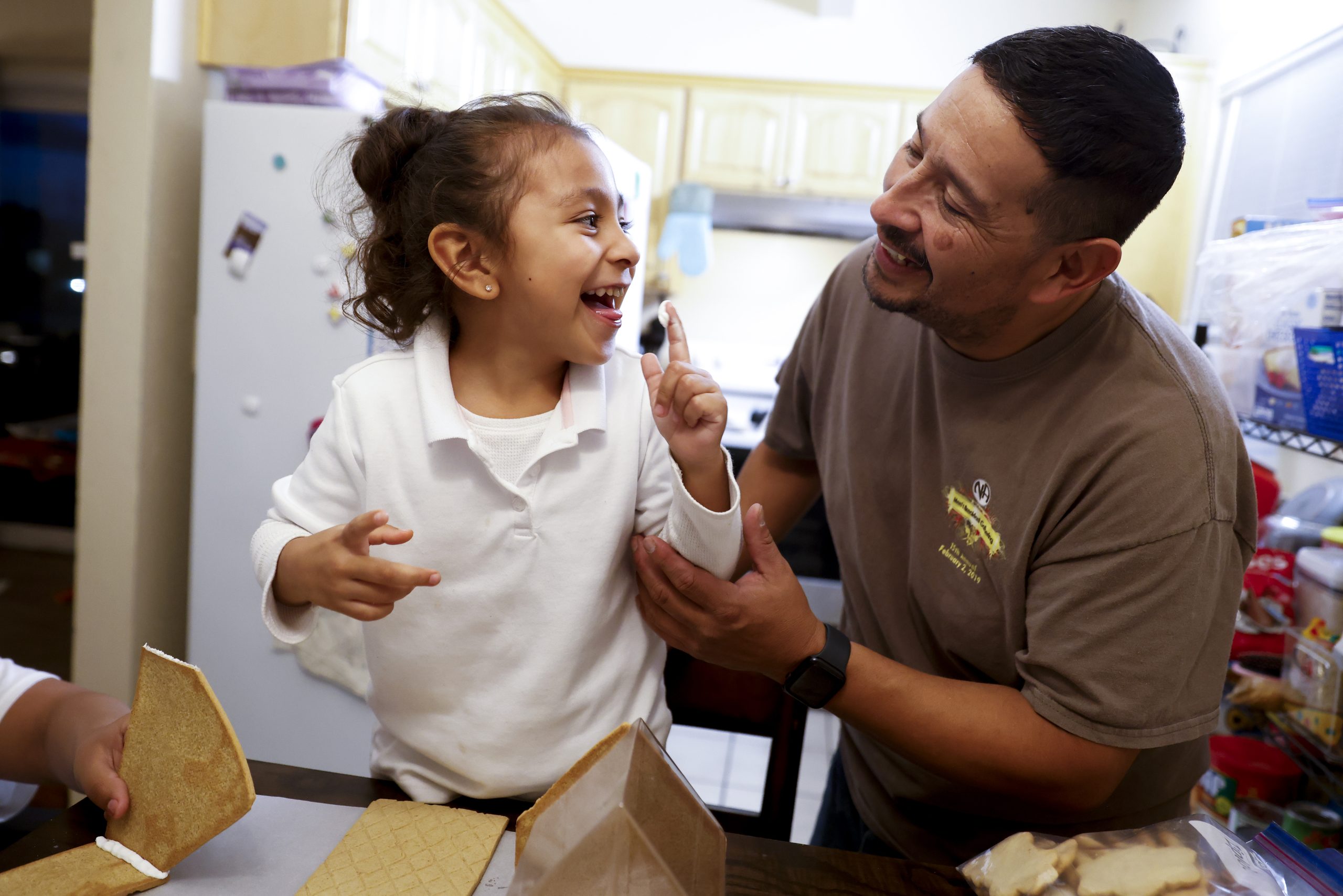Renee Boult was her mother’s favorite child. Her eight siblings would have confirmed this, said Boult, who grew up in a brown, red-roofed house on Camelia Street in Berkeley.
Boult became homeless in her 20s. After years of struggle and drug addiction, she put herself through school, got a job as a counselor for homeless folks, and found an apartment in Oakland.
But when Boult had to abruptly care for her three grandchildren early this year, her financial well-being fell into peril.
“Where Renee lives in Alameda County, a single adult needs to earn $44,000 a year to cover the basic costs of living, and that’s $22 an hour,” Nemsick said. “Right now, our minimum wage is $16 an hour.”
In California, where almost one-third of people live in or near poverty, child care is the largest household expense in all but five counties, according to a study by the economic justice organization Insight Center for Economic Development. And from 2014 to 2021, child care expenses in Alameda County increased by 68% from $1,782 to $2,989 per month for a household with two adults and two children, one preschool and the other school age.
Extra costs such as child care pose a real financial threat to Bay Area residents already living on a financial edge, said Karen Nemsick, housing justice director at the United Way Bay Area nonprofit.
“More than 650,000 people in the Bay Area are struggling to meet their basic needs — food, shelter, medicine,” Nemsick said. “A $500 hospital bill or a $500 unexpected car maintenance problem can throw a family completely off. I would say those families do not have even $500 in savings.”
One of the causes of this problem is the disparity between wages and the cost of housing, she explained.
“Where Renee lives in Alameda County, a single adult needs to earn $44,000 a year to cover the basic costs of living, and that’s $22 an hour,” Nemsick said. “Right now, our minimum wage is $16 an hour.”


“More than 650,000 people in the Bay Area are struggling to meet their basic needs — food, shelter, medicine,” Nemsick said. “A $500 hospital bill or a $500 unexpected car maintenance problem can throw a family completely off. I would say those families do not have even $500 in savings.”
One of the causes of this problem is the disparity between wages and the cost of housing, she explained.
“Where Renee lives in Alameda County, a single adult needs to earn $44,000 a year to cover the basic costs of living, and that’s $22 an hour,” Nemsick said. “Right now, our minimum wage is $16 an hour.”
Born in 1959, Boult regularly brought home medals and trophies as a student athlete at Emery High School in Emeryville. While her mother — a single parent from Galveston, Texas — was never so direct a communicator as to say, “I love you, Renee,” she did proudly display her daughter’s basketball, volleyball and track accolades in the family living room.
When Boult joined the Marine Corps and spent a year in Okinawa, her mother sent letters of encouragement to her every day, and Boult sent her back $50 every month.
“Back then, that was a lot,” Boult said. “She bought a sectional, a beautiful burgundy sectional.”
Boult returned home after three years in the military. She lived with her mother and worked at bakeries in San Francisco and Berkeley, peeling carrots to be folded into carrot cake batter and slicing dough into scones.
But when her mother died two weeks after Renee’s 24th birthday, that loss — plus an undealt-with sexual trauma from when she was in the military — sent Boult into a spiral that transformed her life.
For the next eight years she was homeless, sometimes sleeping on friends’ couches or outside or in her car — when she had one. And she fell into drugs, in particular cocaine.
“When my mother died, I just kind of gave up on life,” she said. “In my 20s, I was living a life of destruction.”
“It’s kind of hard to say what I was doing because I was in a fog from the drug.”
In 1991, Boult gave birth to her daughter. She was able to give up using for six months but continued to struggle with addiction and homelessness. She called a suicide hotline.
“I can’t do this,” Boult remembered saying on the phone. “I can’t do drugs and take care of my kid.”
Friends and family members helped Boult find housing, employment and child care. She joined a recovery program. And then relapsed after nine months.
“I went for a walk, I prayed, I got back into recovery,” she said.
Boult felt deeply humbled by the experience.
“I’m almost 30 years clean and sober now,” she said. “And it was because of my daughter.”
After she got sober, Boult went back to school. She took social service and substance abuse counseling classes at Merritt College. In 2005, she got a job as a substance abuse coordinator in Richmond.
“It was very rewarding,” she said. “I would counsel people and hear their struggle.”
“It was very helpful,” Boult said. “I’m back at my job and doing better.”
In June, Boult was working as a resident counselor for people experiencing homelessness at Bay Area Community Services when she got a call from her daughter, a mother of three young children.
“She was overwhelmed to the point where she was having a nervous breakdown,” Boult said.
Boult stopped working to take care of her grandchildren for three months while her daughter recuperated — and then fell behind on her rent by more than $2,000. She heard about the Chronicle Season of Sharing Fund, applied and received a grant. Boult said she doesn’t know what she would have done without the support.
Season of Sharing works year-round to prevent homelessness and hunger in the nine-county Bay Area. All donations go directly to help people in need.
“It was very helpful,” Boult said. “I’m back at my job and doing better.”
She now lives in East Oakland with an extra room in her apartment for when her grandkids visit and is planning for her retirement, which she hopes will include a vacation to Brazil.
Reach Olivia Cruz Mayeda: olivia.cruzmayeda@sfchronicle.com
Photos by: Jessica Christian/The Chronicle

At Season of Sharing Fund, we believe that an unexpected financial crisis should never mean losing your home. Preventing homelessness isn’t just kind—it’s also the most effective way to keep our communities thriving. 100% of your donation keeps Bay Area residents housed, cared for and nourished.






